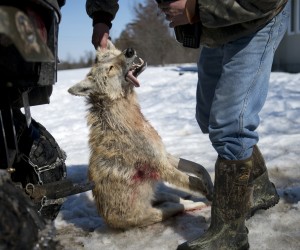Coyotes on the rise in Northumberland
 Coyote attacks have increased in Northumberland County especially this year.
Coyote attacks have increased in Northumberland County especially this year.
Albert Botha, a farmer in the Grafton area, lost 70 sheep alone last year, which totals about $11,200 in loss for him. Botha is not pleased that the municipality is not reinstating the bounty. Botha said the bounty would give hunters the incentive to hunt coyotes more often, which would help diminish the problem much quicker.
“My dogs can fight off a coyote and have killed a coyote but they travel in packs so they don’t stand much of chance,” said Botha.
Mike Gills who has been hunting all his life and has caught 14 coyotes so far this year often gets calls from Botha to help him deal with the coyotes. Last year he said there were only 13 or 14 coyotes caught and he saw a lot less coyotes.
“This year though their numbers are up. The year’s just started and we’ve already caught 26 or 27,” said Gills.
Gills said the reason for people wanting the bounty reinstated was so that people without a trapper’s license could be paid for hunting coyotes.
“Bringing back the bounty would cause a lot of problems among hunters, people would be trespassing and hunters would be arguing with the hunters over who was there first. People would be coming out of town to hunt, too many people hunting one animal,” said Gill.
Botha has not lost any sheep yet this year as he has been keeping them indoors but they’ve also been shooting a lot of coyotes.
The livestock compensation program compensates the farmer if the carcass is found.
“The problem is coyotes drag off the carcass and then you’d never find them,” said Botha.
Botha is running a program with Trent University trying to come up with different methods to deter the coyotes from preying on livestock however none of the methods have worked.
“We’ve been having endless trouble with the coyotes,” said Botha.
 Print This Post
Print This Post






